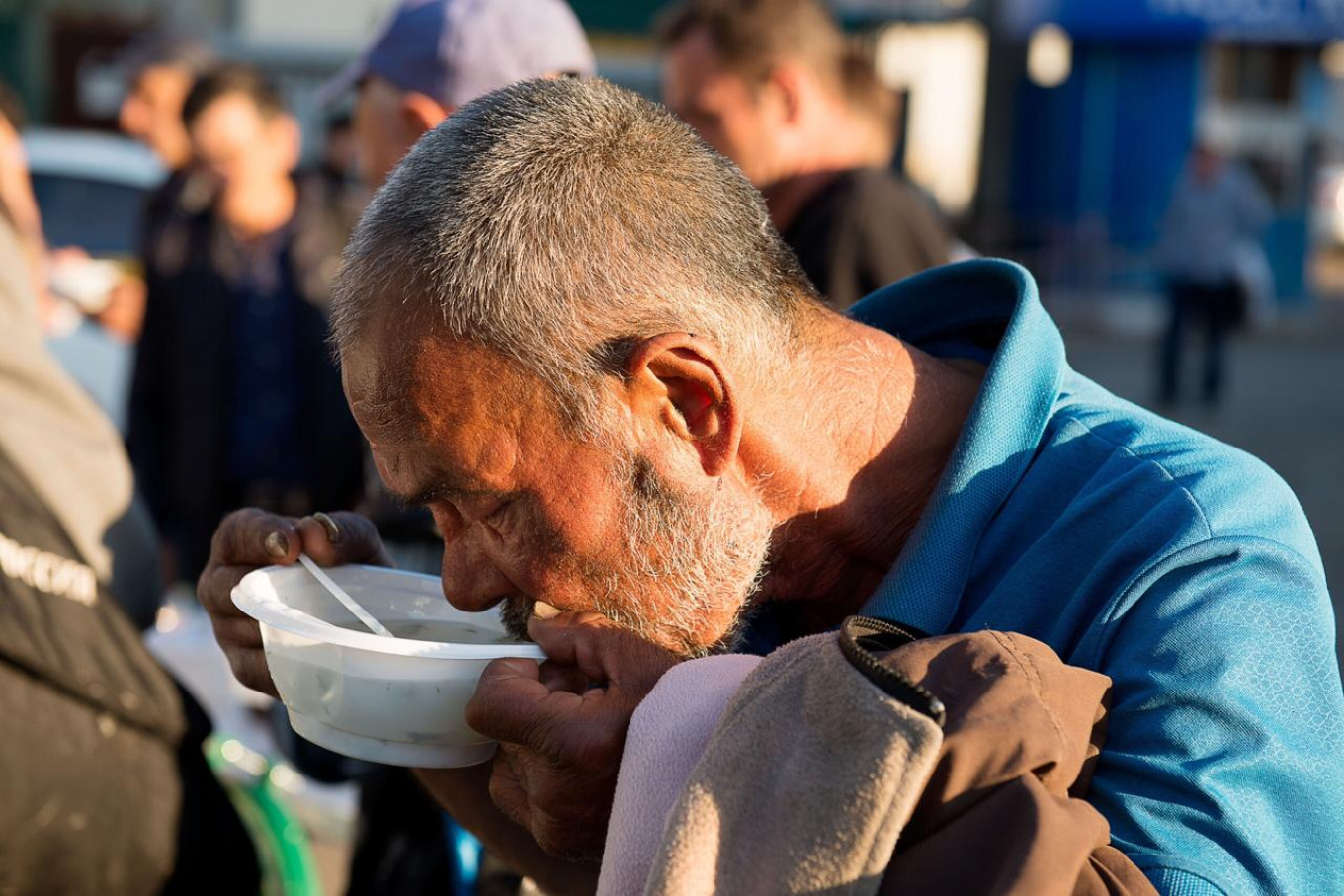In a dingy parking lot hidden behind three of Moscow’s biggest train stations a crowd gathers around a fold-out table laden with vats of boiled buckwheat, fish soup, baked potatoes and hot tea, with cookies and bananas for dessert. For many of the city’s homeless, this is the only chance they have to eat a proper meal.
Up until June 2018, a state-approved homeless shelter occupied the space near Yaroslavsky, Kazansky and Leningradsky stations. But ahead of the World Cup, the authorities relocated it to an industrial area southeast of Moscow in an effort to keep the city’s rough sleepers from the eyes of tourists traveling to stadiums across the country by rail. A year later, the shelter has yet to return to its original location in central Moscow, and the volunteers who fund the soup kitchen say it never will.
“I came to Moscow because I wanted to find work, but without the right documents there is no work,” said Tatyana, a brightly dressed and gregarious woman from the southeastern region of Ryazan, slurping a bowl of soup.
Most of the people who come for a hot meal are men, mainly from Russia’s regions and neighboring countries. Official numbers from Moscow’s Department of Social Protection estimate the number of homeless people in the city at between 15,000 and 18,000, while NGOs estimate that the figures could be much higher.
Dr. Lana Zhurkina, founder and head of homeless medical outreach center Dom Druzei (Friends’ Home) said people used to come to the shelter, which was a large tent, for food and help and to look for lost relatives.
“I wanted it to become the first place offering comprehensive care for the homeless,” Zhurkina said, explaining her decision to set up a facility offering medical care in the original shelter. She and her team now offer treatment at the old site every Thursday.
To counter the removal of state support, several groups and organizations have taken it upon themselves to provide food and medical care for Moscow’s homeless. But they say they can’t provide enough support.
“Previously in the tent, there was psychological assistance, food distribution and medical assistance,” said Anna Romashchenko, one of the organizers of the soup kitchen. “Even in the cold, at minus 30 degrees, in the tent it was not so cold.”
She said she believes the Moscow city authorities have decided that the problem of homelessness has been solved. Romashchenko also worries that the absence of a city-approved tent removes legal protection for those who wish to give out free food.
That the authorities have yet to raise questions or interfere with independently run food distribution doesn’t remove concerns that they won’t.
“Now it is necessary to at least not interfere with those who take it upon themselves to help,” said Georgina Yusefovna, a Syrian woman who has been involved in food distribution for the homeless in Moscow since 2017.
Independently organized and largely self-funded, most of the volunteer groups do everything from start to finish, from buying the ingredients to cooking the food, then distributing it and cleaning up after. Hygiene standards are kept with face masks and gloves, and some who come for food regularly help volunteers to keep things in order.
“There are volunteers giving out food here most days,” said Andrei, who said he has survived without a home all his life – on the streets in summer, in train stations during winter. And if not? Andrei points at a pile of trash and remains from a previous food distribution.
“I come from a trash can,” he said. “I’m here alone, but this is my family now.”
 Volunteer groups say they can’t provide enough support. Olga Konovalova
Volunteer groups say they can’t provide enough support. Olga KonovalovaBeyond food, the free medical treatment provided is vital all year round. Common seasonal ailments are acute respiratory infections and trench foot in spring and fall, bronchitis and cystitis in winter, diarrhea in summer and leg swelling throughout the year.
“Homeless people suffer from all the same diseases as people who have homes,” Zhurkina explained.” It’s just harder for them to get planned care and outpatient treatment.”
Nikolai, a man with striking white hair and a long beard, said he never goes to see the doctor if he’s sick. “Seeing the doctor costs money, and I’m not the president,” he said.
Having given up on the return of the tent, volunteers say the city should provide a free, unified program for the socialization of the homeless.
“The stereotype that a homeless person is an alcoholic, a drug addict, and so on, must be broken,” said Romashchenko, who believes a campaign to call attention to the issue of homelessness needs to be implemented.
“Moscow needs to stop turning a blind eye to the problem,” she said.
